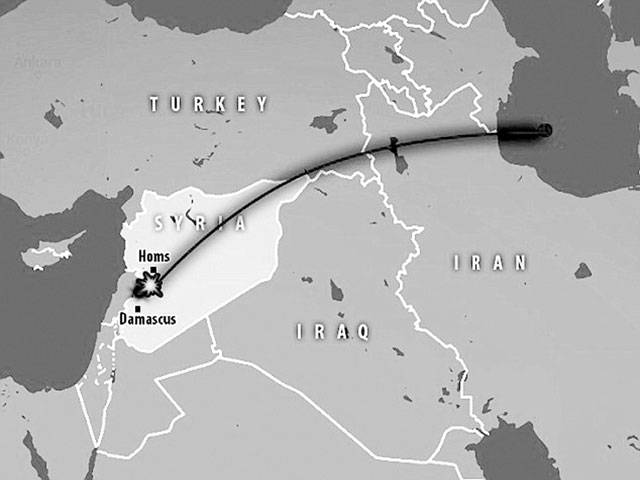BEIRUT - Heavy Russian aerial bombing and cruise missile strikes launched from warships in the Caspian Sea on Wednesday provided cover for a major Syrian army ground offensive in a coordinated attack on rebels.
Amid a dramatic escalation in its air war over Syria, Moscow said it was ready to establish contacts with Western-backed rebels, which the United States and its allies accuse Russia of targeting in bombing raids.
But the announcement came as Russian President Vladimir Putin said Moscow had begun synchronising its strikes with the Syrian army's ground movements.
Putin, who celebrated his 63rd birthday Wednesday, also announced for the first time that four Russian warships had struck IS targets with 26 cruise missiles.
Russian air strikes have destroyed the main weapons depots of a US-trained rebel group in Syria, their commander said on Wednesday, in an expansion of Russian attacks on insurgents backed by foreign enemies of President Bashar al-Assad.
The Liwa Suqour al-Jabal, whose fighters have attended military training organised by the Central Intelligence Agency in Saudi Arabia and Qatar, was also hit last week by Russian raids as Moscow began its air campaign in support of Damascus. New strikes targeted the group's main weapons depots in western Aleppo province and completely destroyed them late on Tuesday, its commander Hassan Haj Ali told Reuters on Wednesday via Internet messaging service.
"These were considered the principal depots of the Liwa," he said in an audio recording obtained separately. A video map released by Russia's defence ministry showed the missiles launched from warships in the southern Caspian Sea and flying close to 1,500 kilometres (930 miles) through Iranian and Iraqi airspace before hitting targets in Syria.
A Syrian military source told AFP that government troops had begun a broad ground operation on Wednesday near the village of Latmeen in Hama province, aided by Russian air cover.
The Syrian Observatory for Human Rights said Russian planes had carried out at least 37 strikes on Wednesday in Hama and neighbouring Idlib province, which is controlled by the powerful Army of Conquest alliance that includes Al-Qaeda affiliate Al-Nusra Front.
The rebel alliance has sought to expand into Hama from Idlib and seize high ground to target the neighbouring regime stronghold of Latakia province.
"The Syrian army in its latest operations is working on cutting off the southern parts of Idlib province from the northern parts of Hama province," a military source in Hama told AFP.
He added that the operations were also intended to begin securing the major highway between Aleppo and Damascus. In Moscow, Putin said Russian strikes would "be synchronised with the actions of the Syrian army on the ground" to support the regime's offensive operations.
AFP has concluded after a careful reading of Russia's video map that at least one cruise missile struck near the IS-held city of Al-Bab in Aleppo province, while several others appeared to head towards targets in Idlib province.
Russia has said its forces have hit 112 targets since its operations in Syria - which it insists target IS and other "terrorist groups" - began on September 30.
But Syrian rebels and their backers say a range of opposition fighters, not just jihadists, have been hit.
The ground operation in Hama targets rebels from a range from groups, including moderate and Islamist opposition fighters as well as Al-Nusra.
And on Wednesday the US-backed Suqur al-Jabal rebel group in the northern province of Aleppo said its arm depots had been destroyed in Russian raids.
Turkey's Prime Minister Ahmet Davutoglu alleged that just two out of 57 Russian strikes examined by Turkish intelligence had hit IS.
The Russian campaign has raised hackles in Ankara, which accuses Moscow of violating its airspace from Syria on at least two occasions over the weekend.
It also reported a violation by a MIG-29 jet of unknown nationality on Monday.
Turkey has protested the violations, backed by the NATO alliance to which it belongs, and warned Russia against losing its friendship with Ankara, which has been tested over Syria.
Ankara backs the opposition, while Russia has been a staunch regime ally throughout the conflict that began in March 2011 and has so far killed more than 240,000 people.
Tensions between Russia and the United States also escalated on Wednesday, with Defence Secretary Ash Carter insisting that the US is not cooperating with Russia over Moscow's air campaign.
"I have said before that we believed that Russia has the wrong strategy - they continue to hit targets that are not ISIL. We believe this is a fundamental mistake," Carter told a press conference in Rome, referring to IS by an alternative name.
Meanwhile, French President Francois Hollande warned that failure to act in Syria risked "total war" in the Middle East.
"If we leave these religious clashes between Sunnis and Shiites, they will grow. Don't think we will be sheltered, this will be a total war," he said in a speech to the European Parliament.
Putin on Wednesday said Hollande had proposed "to at least try to unite the efforts of the government troops of President Assad's army and the so-called (rebel) Free Syrian Army," but a member of Hollande's entourage quickly rebutted the claim.
Moscow's foreign ministry also said it was ready to make contact with the FSA, a group it previously claimed did not exist.
"At the president's request, the foreign ministry informs our partners in countries that have links to the Free Syrian Army of the Russian side's readiness to establish contacts with the leadership of this structure," the ministry said.
Thursday, April 18, 2024
Russia intensifies strikes in Syria

Hepatitis Challenge
April 18, 2024
IMF Predictions
April 18, 2024
Wheat War
April 18, 2024
Rail Revival
April 17, 2024
Addressing Climate Change
April 17, 2024
Justice denied
April 18, 2024
AI dilemmas unveiled
April 18, 2024
Tax tangle
April 18, 2024
Workforce inequality
April 17, 2024
New partnerships
April 17, 2024
ePaper - Nawaiwaqt
Advertisement
Nawaiwaqt Group | Copyright © 2024





